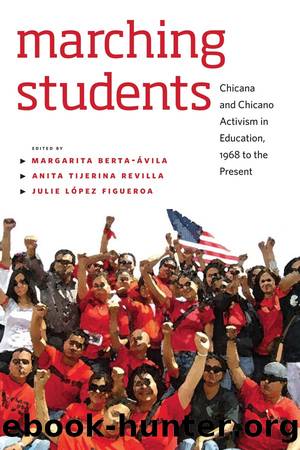Marching Students by unknow

Author:unknow
Language: eng
Format: epub
ISBN: 9780874178616
Barnesnoble:
Publisher: University of Nevada Press
Published: 2011-02-28T00:00:00+00:00
CHAPTER 4
Activating Parentsâ Voices
EDWARD M. OLIVOS
CARMEN E. QUINTANA
The United States has a long history of ignoring the educational and social needs of bicultural communitiesâLatino/Chicano, African American, Native American, and othersâwhile at the same time eradicating their strengths, such as culture, language, history, traditions, and so forth (Spring 2005).1 Bicultural communities, however, have not always stood idly by, allowing the dominant group in society the free rein to dictate the terms of their existence. On the contrary, bicultural communities have a long record of resisting the oppressive practices of the dominant institutions of the United States and its agents. For the Latino/Chicano community, in particular, this resistance has manifested itself in many ways and through many generations; most notably, Latino/Chicano resistance has been exhibited through social movements, such as civil action, and civil disobedience, such as boycotts, walkouts, protests, hunger strikes, and so on.2 And although generally successful in the past, the current challenge for Latino/Chicano activists rests in defining how effective these forms of resistance will continue to be and the extent to which they can serve to establish a broader support base of resistance against acts of racism and exploitation, particularly within the public school context.
The context of this book is the 1968 Chicana/o student walkouts, or âBlowouts,â of East Los Angelesâone of the largest events of the early Chicana/o movement. Led by legendary Chicano teacher Sal Castro and Chicana/o student leaders, thousands of students walked out of East Los Angeles high schools to protest poor learning conditions and the lack of learning opportunities afforded to low-income Chicana/o students. Upon concessions from the Los Angeles School Board, and other political and moral victories, the 1968 walkouts demonstrated to many in âmainstreamâ America the political potential of an organized social movement for disenfranchised youth and communities. Moreover, the walkouts demonstrated to the nation the level of political sophistication and consciousness that existed among Chicana/o youth and communities. These victories also helped solidify the walkout as a political tool for Chicana/o activists and supporters, something that continues to this day. It is within this context of a historically successful social movement among Latinos/Chicanos that we write this chapter.
This chapter will speak to the issue of the need to improve the educational experiences of Latino/Chicano students by redefining the role of their parents and communities in the school system. As longtime education and community/parent partners, we argue that a critical element in creating schools, and ultimately societies, that respond to the particular needs and strengths of bicultural children is what parents and communities are doing as educational activists and advocates (Olivos 2003, 2004, 2006; Olivos and Quintana de Valladolid 2005; Quintana 2005). Specifically, we propose that in order to achieve Latino/Chicano solidarity for the common cause of transforming the schools to meet their own and their childrenâs needs, all bicultural parents (and the teachers who serve them) must develop a critical consciousness that will enable them to become political catalysts that will allow them and others to âunmaskâ the contradictions inherent in the U.
Download
This site does not store any files on its server. We only index and link to content provided by other sites. Please contact the content providers to delete copyright contents if any and email us, we'll remove relevant links or contents immediately.
| Appreciation | Blank Sheet Music |
| Composition | Conducting |
| Exercises | Instruction & Study |
| Lyrics | MIDI, Mixers, etc |
| Philosophy & Social Aspects | Songwriting |
| Techniques | Theory |
| Vocal |
The Goal (Off-Campus #4) by Elle Kennedy(13678)
Kathy Andrews Collection by Kathy Andrews(11839)
Diary of a Player by Brad Paisley(7584)
Assassin’s Fate by Robin Hobb(6225)
What Does This Button Do? by Bruce Dickinson(6208)
Big Little Lies by Liane Moriarty(5806)
Altered Sensations by David Pantalony(5106)
Pale Blue Dot by Carl Sagan(5012)
Sticky Fingers by Joe Hagan(4204)
The Death of the Heart by Elizabeth Bowen(3625)
The Heroin Diaries by Nikki Sixx(3552)
Confessions of a Video Vixen by Karrine Steffans(3311)
Beneath These Shadows by Meghan March(3309)
How Music Works by David Byrne(3272)
The Help by Kathryn Stockett(3150)
Jam by Jam (epub)(3095)
Harry Potter 4 - Harry Potter and The Goblet of Fire by J.K.Rowling(3076)
Computational Linguistics and Intelligent Text Processing: 20th International Conference, CICLing 2019 La Rochelle, France, April 7â13, 2019 Revised Selected Papers, Part I by Alexander Gelbukh(2995)
Strange Fascination: David Bowie: The Definitive Story by David Buckley(2872)
